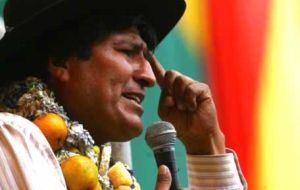MercoPress. South Atlantic News Agency
Bolivia's recall vote could confirm political stalemate
 Bolivia's first indigenous leader Evo Morales
Bolivia's first indigenous leader Evo Morales Bolivian President Evo Morales is expected to survive a recall vote this Sunday but there are growing concerns about the ongoing political stand off with the conservative opposition which is intent in blocking many of his reforms they define as “socialist”.
Morales and eight of Bolivia's nine provincial governors face Sunday's recall votes, which the president ordered in a bid to undermine the governors and curtail momentum from the autonomy movements in the richest provinces of the country. Bolivia's first indigenous leader hopes a recall win will allow him to re-launch reforms such as nationalizations and land redistribution among peasants and Indians which make the backbone of his electoral support. He has already nationalized energy, mining and telecommunications. But in spite of the strong showing in the opinion polls, Morales reforms have increasingly divided the country and violent protests forced him to suspend several campaign events this week. President Morales was visibly shaken by protests across the country on Tuesday, when two tin miners were killed and an airport was stormed, forcing Venezuelan President Hugo Chavez and Argentine President Cristina Fernandez to abandon a visit to sign energy accords. A day later, Morales was forced to suspend a campaign rally in the eastern, opposition-run city of Santa Cruz after anti-government protesters blocked roads and surrounded a stadium where the event was to take place. "I am very sad to see that the dictatorships of the 1960s and 1970s are being replaced by groups who take over airports and electoral courts and who shoot at ministers' cars," Morales said in a speech at a military parade in Cochabamba. Morales is also pushing for a new constitution to give more power to Bolivian Indians which make up over two thirds of the country's 9 million people. "Bolivia has been in a state of political stalemate for over a year, and no matter how the votes count up after Sunday, Bolivia will still be in a place of political stalemate," said Jim Shultz, executive director of the Democracy Center think-tank in Cochabamba. "We are likely to see continued battles between the president and regional governments over what kind of decentralization and autonomy takes place. Land reform will probably continue to be stalled completely, and there will be ongoing fights over how to divide up the expanding pie of natural gas and oil revenue" predicted Shultz.




Top Comments
Disclaimer & comment rulesCommenting for this story is now closed.
If you have a Facebook account, become a fan and comment on our Facebook Page!